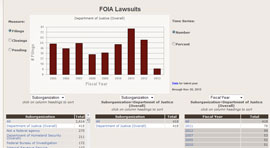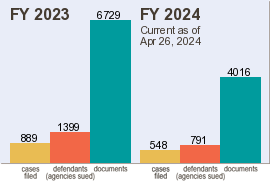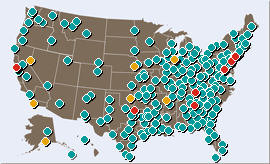Good Things Come to Those Who Wait?
By the Numbers
| 12 | FOIA requests TRAC has sent to ATF since June 18, 2014. |
| 743 | Days since sending the June 18, 2014, request with absolutely no response from ATF. |
| 4 | Acknowledgement letters received from ATF in response to subsequent requests. |
| 284 | Days since the submission of the FOIA request for which TRAC received an acknowledgement last week. |
| 0 | Records or final determination letters received. |
The Transactional Records Access Clearinghouse (TRAC) has made 12 Freedom of Information Act requests to the Bureau of Alcohol, Tobacco, Firearms and Explosives dating back to June 18, 2013.
Yet TRAC has not received a single requested record from the ATF as a result of these requests, which seek data on the agency’s processing of FOIA requests. Nor has TRAC received a final determination letter for any of the 12 requests.
In fact, the only communications it has received from ATF are four acknowledgement letters, including one that arrived last week, which was sent 284 days after TRAC made the original request.
TRAC is a nonpartisan, nonprofit data research center at Syracuse University that, among other things, administers the FOIA Project.
The Freedom of Information Act requires that federal agencies “upon any request for records … shall determine within 20 days (excepting Saturdays, Sundays, and legal public holidays) after the receipt of any such request whether to comply with such request and shall immediately notify the person making such request of such determination” (6)(A)(i).
Meanwhile, the Department of Justice, which includes the ATF, states in its own FOIA regulations that (a) its component agencies normally handle requests in the order in which they are received, (b) those components must start working on the request within 10 business days, (c) the agency will inform the requester and provide an estimated date of completion if it can’t meet the 20 day requirement set forth in the law.
TRAC’s record of dealing with the ATF provides evidence that the agency is failing to follow any of these requirements.
The most recent correspondence from the ATF received by TRAC is dated July 24, 2015, and is in response to an Oct. 13, 2014, request. That’s 284 calendar days later, an even longer time period than the last ATF acknowledgement TRAC received. Excluding weekends and public holidays, that’s about 193 days, or 173 days longer than required by law, to provide us with a final determination letter. The letter does not provide an explanation for the delay, nor does it provide an estimated completion date.
There is also no discernible pattern to the timing of the acknowledgement letters TRAC has received. TRAC has received an acknowledgement, for instance, for an April 16, 2015, request to ATF, yet it has never received any correspondence concerning its first request to the agency in 2013.
All of the requests to ATF have been for basic records concerning the agency’s processing of FOIA requests. ATF, like other federal agencies, is required by law to keep these records. TRAC limits the scope of these requests to ask only for information that is clearly in the public domain and has not asked for any fields that might require redaction.
An ATF disclosure staffer said that the delay in sending out the most recent acknowledgement letter TRAC has received was partially the result of the complexity of TRAC’s request (a characterization TRAC disagrees with), as well as the ATF’s backlog of requests.
ATF received 1,282 FOIA requests in FY 2014, according to the Department of Justice’s Annual FOIA Report. ATF reports that it processed 744 during the year, and ended the fiscal year with a backlog of 1,310 requests, nearly 70 percent higher than its backlog at the end of FY 2013. Of the requests ATF closed in 2014, it reports that it took an average of 59 days to close requests that it deems “simple,” and 115 for requests it put in the “complex” track.
TRAC has asked for additional clarification on why ATF struggles to keep pace with the requests it receives, on when TRAC can receive answers to its pending FOIA requests, and on why TRAC’s requests are taking longer than average to process.
 Recent Tweets
Recent Tweets


